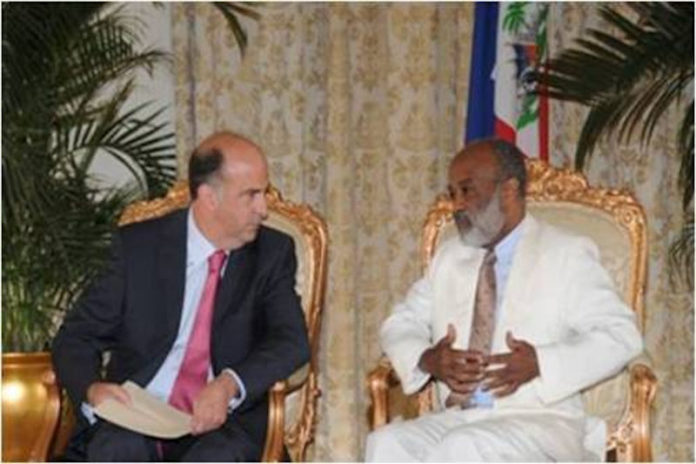
(Français)
The United States and other international donors decided to support Haiti’s recent presidential and parliamentary elections despite believing that the country’s Provisional Electoral Council (CEP), “almost certainly in conjunction with President Préval,” had unwisely and unjustly excluded the country’s largest party, the Lavalas Family, according to a secret U.S. Embassy cable dated Dec. 4, 2009 provided by WikiLeaks to Haïti Liberté.
The meeting of representatives from the European Union and United Nations with ambassadors from Brazil, Canada, Spain and the U.S., decided to knowingly move ahead with the flawed polling because “the international community has too much invested in Haiti’s democracy to walk away from the upcoming elections, despite its [sic] imperfections,” in the words of the EU representative, according to U.S. Ambassador Kenneth Merten’s cable.
Donor nations had “too much invested… to walk away from the upcoming elections…despite imperfections.”
The Lavalas Family (FL) is the party of then-exiled former President Jean-Bertrand Aristide, who was kidnapped by a U.S. Navy Seal team on Feb. 29, 2004 and flown to Africa as part of a coup d’état that was supported by France, Canada, and the U.S..
This history made Canadian Ambassador Gilles Rivard worry at the Dec. 1, 2009 donor meeting that “support for the elections as they now stand would be interpreted by many in Haiti as support for Préval and the CEP’s decision against Lavalas.” He said that the CEP had reneged on a pledge to “reconsider their exclusion of Lavalas.”
“If this is the kind of partnership we have with the CEP going into the elections, what kind of transparency can we expect from them as the process unfolds?” Rivard asked.
The donors were concerned only about appearances in the case of the Lavalas exclusion, the cable makes clear. But they were mostly worried about strengthening “the opposition” (code for “right-wing”) which, for them, Préval had “emasculated.” The EU and Canada therefore proposed that donors “help level the playing field” by doing things like “purchase radio air time for opposition politicians to plug their candidacies.” Otherwise, the right-wing “will cease to be much of a meaningful force in the next government.”
Such plans to brazenly meddle and play favorites in Haiti’s sovereign electoral process presaged how Washington would forcefully intervene in the elections when they finally did take place on November 28, 2010, followed by run-offs on March 20, 2011.
Those interventions – primarily by the Organization of American States (OAS) or what Cuba calls Washington’s “Ministry of Colonial Affairs” – assured the victory of pro-U.S. coup-cheerleader Michel “Sweet Micky” Martelly, 50, a former lewd konpa musician, despite a dramatically flawed, and often illegal, electoral process as well as an anemic voter turn-out.
Merten had opposed FL’s exclusion because, he wrote, the party would come out looking “like a martyr.”
Less than 23 percent of Haiti’s registered voters had their vote counted in either of the two rounds, the lowest electoral participation rate in the hemisphere since 1945, according to the Washington-based Center for Economic and Policy Research.
Furthermore, the second round was illegal because the eight-member CEP could never muster the five votes necessary to ratify the first round results which Washington and the OAS imposed.
The December 2009 donor meeting took place just over a month before the Jan. 12, 2010 earthquake which would derail the elections originally planned for Feb. 28, 2010. When the polling was rescheduled, there was even more at stake, primarily how $10 billion of pledged earthquake aid would be spent and the future of the 11,500-strong UN military force that has occupied Haiti since the 2004 coup d’etat. The U.S. has been the most adamant in making a show election to keep a democratic face on the highly unpopular and costly military occupation, which now costs close to $1.5 billion annually.
Ambassador Merten urged a minimal donor reaction to the FL’s exclusion, saying they should just “hold a joint press conference to announce donor support for the elections and to call publicly for transparency” because ““without donor support, the electoral timetable risks slipping dangerously, threatening a timely presidential succession..”
His cable was classified “Confidential” and “NOFORN,” meaning “Not for release to foreign nationals.”
Merten had opposed FL’s exclusion because, he wrote, the party would come out looking “like a martyr and Haitians will believe (correctly) that Préval is manipulating the election.”
The banning of the FL from the election “for not turning in the proper documentation” set the stage for Martelly to go up against another neo-Duvalierist candidate, Mirlande Manigat.
The election’s low turn out has been ascribed to the futility of choosing between two unappealing candidates, a grassroots boycott campaign, and, primarily, popular dismay over the FL’s exclusion, the very issue that gave rise to the December 2009 meeting.
Former President Aristide, who returned to Haiti from exile on Mar. 18, two days before the second round, drove the point home when he declared on his arrival: “The problem is exclusion, the solution is inclusion.”









